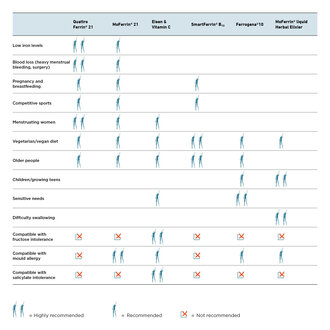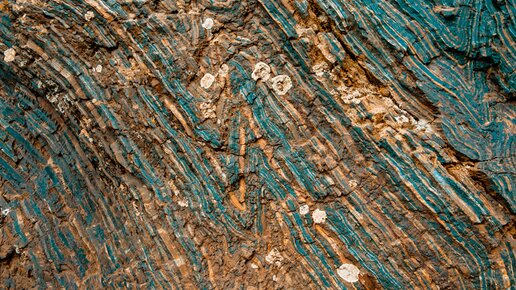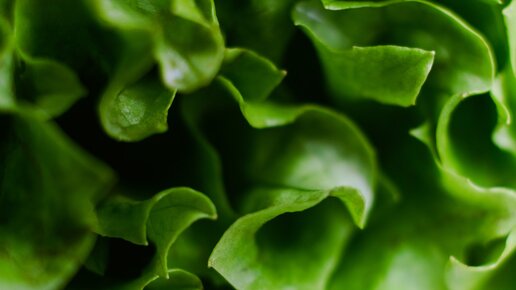There are worlds of difference between the different types of iron. To understand this, it’s worth learning more about heavy metals before buying a food supplement. We explain what to look out for and present our test winner to you.
How do the best iron supplements differ from the rest?
The best iron supplements stand out from the standard market products in a number of respects. This starts with the selection of the world's best and most innovative raw materials, continues through formulations and dosages at the cutting edge of science and stops with the special purity of the product. Accordingly, the top iron preparations contain only the best ingredients paired with a lot of know-how – with such a quality package there is no room for unnecessary additives.
What iron forms are there – and why is that even relevant?
To understand which iron supplement is best, it helps to know, among other things, that iron is present in different forms and is absorbed by the body differently depending on the form. The different iron forms use different transport systems.
Here are the most important iron types and their differences:
| Iron form | Found in | Route of absorption | Additional information |
| Heme iron | Meat, poultry, fish | Heme transporter HCP-1 (= Heme Carrier Protein-1) | The absorption of heme iron from meat, poultry and fish is considered particularly effective and is hardly influenced by other food components. |
| Iron salts or iron ions |
Commercially available iron products Foodstuffs |
Transport protein DMT1 (= Divalent Metal Ion Transporter-1) |
DMT1 can only transport bivalent iron into the body. Animal foods contain bivalent iron (Fe2+), while vegetable iron is usually present in the form of trivalent iron (Fe3+), which must be converted into bivalent iron before absorption. Vitamin C helps by converting trivalent iron into bivalent iron. In addition, our intestinal mucosa has enzymes that are able to do this to a certain extent.
|
| Plant-based storage iron (ferritin) |
Plant-based food |
Transporter for vegetable iron |
This transport system has not yet been researched in detail. Plant-based ferritin can therefore be a good alternative for people who do not absorb iron from conventional preparations, as it uses a different transport route for absorption.
|
Table 1: Iron types and their transport routes
Organic iron bisglycinate is a form of iron that the body absorbs particularly well and is therefore often found in dietary supplements. In this compound, the iron is present as a so-called chelate (Greek: "clamp"). The iron ion sits in the middle, while it is clamped by the amino acid glycine to the left and right. A great advantage of this form is that it increases the iron’s tolerability and at the same time shields it from interfering factors (e.g. phytates, oxalates). In addition, the mineral element bound to glycine is very well absorbed by the small intestine.
Why is it important to know about this? Because every person is individual and therefore can absorb the different iron forms to different degrees. This knowledge is particularly valuable for those people whose iron levels do not respond to the market-standard iron salts or do not respond well to them. In addition, iron compounds are tolerated differently – especially at higher doses. While inorganic iron salts often cause gastrointestinal problems (e.g. diarrhoea, constipation, nausea), organic iron bisglycinate is gentler. Plant-based iron compounds are considered particularly gentle and well tolerated.
Iron compounds approved for nutritional supplements:
Organic iron compounds: Iron bisglycinate, iron citrate, iron ammonium citrate, iron gluconate, iron fumarate, iron lactate, iron saccharate, iron L-pidomate, iron(II) taurate
Inorganic iron compounds: Elementary iron, iron carbonate, iron sodium diphosphate, ferrous sulphate, iron diphosphate (iron pyrophosphate), iron phosphate
In summary: Haem iron from meat is the easiest to absorb and the least susceptible to interference. Iron bisglycinate is a particularly well-tolerated organic iron salt. Its special chemical structure protects the iron from disruptive substances and improves absorption in the intestine. Ferritin from plants is ultimately an interesting alternative for people who do not absorb conventional iron preparations well. In general, iron absorption in the body can be improved by a combination with vitamin C.
BIOGENA – the iron expert
There is a lot of experience, sensitivity and know-how behind the development of gentle and effective iron preparations. The development of tolerable and efficient iron preparations is both a point of honour and a matter of personal importance for BIOGENA as a 361° company. With the use of special iron compounds – such as valuable iron from plants – with deliberately gentle dosages and smart combinations, BIOGENA opens up new paths as the iron expert in the premium supplements segment.
The BIOGENA Iron Stars
BIOGENA offers a real range of iron stars, which – each in themselves – encompass special qualities. Whether you are looking for a highly compatible iron supplement or are more focused on optimal bioavailability, the BIOGENA full range has the right product ready for every "iron taste".
Which iron is contained in which BIOGENA iron supplement?
But which BIOGENA iron supplements are there – and which "hot iron" is contained in each of them? Our brief overview:
| Type of iron | Properties | Supplement |
|
Plant-based iron from the curry leaf (VegyFerrin®) |
|
MoFerrin® 21 – with 21 mg iron per capsule QuattroFerrin® 21 – with 21 mg iron per capsule MoFerrin® liquid Herbal Elixir – with 5.6 mg iron per daily dose |
| Organic iron (iron bisglycinate) |
|
QuattroFerrin® 21– with 21 mg iron per capsule Iron & Vitamin C – with 15 mg of iron per capsule |
| Inorganic iron (iron pyrophosphate) |
|
QuattroFerrin® 21 – with 21 mg iron per capsule |
| Patented mushroom iron (ULTIMINE) from the Koji mushroom (Aspergillus oryzae) |
|
QuattroFerrin® 21 – with 21 mg iron per capsule SmartFerrin® B12 – with 12 mg iron per capsule in combination with vitamin B12, vitamin C and copper |
| Vegetable iron from buckwheat |
|
Ferrogena® 10 – with 10 mg iron per capsule |
Table 2: Iron in BIOGENA iron supplements
Which iron supplements are best?
Best iron supplement for pregnancy and for women
When pregnant, high-quality iron supplements help to supply mother and child with sufficient iron. Iron capsules that use special plant extracts as an iron source, are considered particularly gentle and well tolerated. Women who become sensitive to the taste of certain foods during pregnancy often prefer taste-neutral iron capsules or tablets. The choice should be made for particularly pure products. In contrast to tablet production, unnecessary additives can be avoided in capsule production. In order to select a perfect dosage, the treating gynaecologist should be consulted.
Best iron supplement for kids
Iron syrups can be a great-tasting source of extra iron during pregnancy. Especially among the youngest among us, the focus should be not only on taste but also on quality when selecting products. While many iron syrups contain iron salts, which is not always immediately apparent, there are others that use plant-based extracts as their iron source. Since iron preparations are generally taken over a longer period of time, the selected syrop should definitely be free of unnecessary additives. Parents who suspect an iron deficiency in their child should ideally seek advice from a doctor. The doctor can recommend a practical and appropriate iron preparation.
Best vegetarian iron supplement and iron for vegans
Ideally, the best iron products for vegans do not only supply iron, but at the same time provide a smart solution for the supply of further critical nutrients. A vegetarian or vegan diet is usually associated with a healthier lifestyle. However, by completely avoiding animal products, the adequate intake of some nutrients can be more difficult. Iron and copper levels should be kept in mind in vegetarian or vegan diets, and vitamin B12 is a critical nutrient in strictly vegan diets.
Which of our BIOGENA preparations do we recommend for which needs?

Our iron products test winners: MoFerrin® 21
MoFerrin®21 has been the reigning iron star in BIOGENA for years and impresses with its optimal tolerability and high receptivity. The efficient iron formula features iron from special vegetable premium extracts and natural vitamin C from amla and acerola fruit. At the same time, MoFerrin® 21 is rightly the tried and tested and long-serving favourite of BIOGENA customers and partners in therapy support, prevention and for a potential-oriented lifestyle.
Conclusion: Iron deficiency is the most common deficiency in the world. For this reason, BIOGENA has been committed to combating this deficiency for over 10 years. Through its intensive research work, which has been further boosted and accompanied by in-house iron studies, BIOGENA as a 361° health and scientific knowledge company has shown that all iron is not the same. If you want to make the best choice when it comes to iron, you can rest assured that you are in good hands with BIOGENA, THE iron expert.
Frequently asked questions
For iron deficiency, a product that uses different sources of iron is ideal. This serves all the iron absorption mechanisms in the human body, leading to better absorption capacity and at the same time very good tolerability. In principle, moderate doses are recommended, since they are proven to be well absorbed and are simultaneously well tolerated.
The best way for our body to absorb iron is by using heme iron, which makes up about half of the iron contained in meat and fish. However, plant-based iron or iron salts are also effective, especially if there is already an under-supply and the body increases the absorption accordingly – the combination with vitamin C is ideal here to increase the absorption of iron and a moderate dosage.
Iron preparations that enter the body via several pathways are usually best absorbed. Therefore, products containing different iron forms such as organic iron bisglycinate and vegetable iron should be used to ensure the best possible iron supply. By combining with vitamin C, iron absorption can be further optimised.
Plant-based iron is considered particularly gentle and stomach friendly. This makes preparations containing plant-based special extracts a tolerable alternative to conventional iron salts.
Yes, iron can easily be taken with amino acids. The combination of iron with sulphurous amino acids is actually highly recommended, as this can increase the iron absorption into the body.










